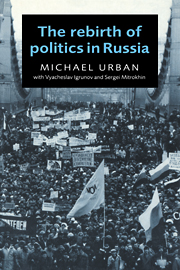Book contents
- Frontmatter
- Contents
- Preface
- Part I The pre-political context
- Part II Perestroika and the return of political life
- 3 Perestroika: renewal, transition or transformation?
- 4 Glasnost, mass media and the emergence of political society
- 5 The informal movement: politics on the margins of the soviet order
- 6 National elections and mass politics
- Part III Politics and revolution
- Part IV Ground up: politics in post-communist Russia
- Notes
- Index
5 - The informal movement: politics on the margins of the soviet order
Published online by Cambridge University Press: 22 October 2009
- Frontmatter
- Contents
- Preface
- Part I The pre-political context
- Part II Perestroika and the return of political life
- 3 Perestroika: renewal, transition or transformation?
- 4 Glasnost, mass media and the emergence of political society
- 5 The informal movement: politics on the margins of the soviet order
- 6 National elections and mass politics
- Part III Politics and revolution
- Part IV Ground up: politics in post-communist Russia
- Notes
- Index
Summary
The terms ‘informals’ (neformaly) and ‘informal groups’ (neformal'nye gruppy) would refer to those millions of Soviet citizens who took advantage of the relative liberalization introduced by perestroika to band together in associations independent of the party-state's direct sponsorship. By 1989, some 60,000 of these associations were functioning in the country, spanning a wide range of activities and interests: music, sports, literature, history, culture, religion, social service and politics. The origins of the name for this amorphous mass movement have remained unclear. By the mid–1980s, ‘informals’ or ‘informal groups’ had entered the argot of Soviet journalism as a deprecatory descriptor for those people congregating outside of the ‘respectable’ world of the establishment, but a decade earlier it had also been used in Soviet sociology as a euphemism for teenage gangs. However, the source of the name would not be as important for our purposes as would be an understanding of the significance that it came to hold for those to whom it was applied. It was precisely because the informal movement was rooted in one or another form of rebellion against the stifling restrictions of the Soviet order that informals would wear this veiled epithet as a badge of honour. The name became for them a vivid distinction separating their subculture – wherein authenticity, free expression and relevance were paramount – from the official world around them that they had come to regard as dominated by insincerity and pretension, one not only repressive but top-heavy with stupidity.
Unofficial groups – from discussion clubs to insurrectionist organizations – had been to one degree or another a part of the Soviet social landscape throughout the post-war period.
- Type
- Chapter
- Information
- The Rebirth of Politics in Russia , pp. 95 - 118Publisher: Cambridge University PressPrint publication year: 1997



